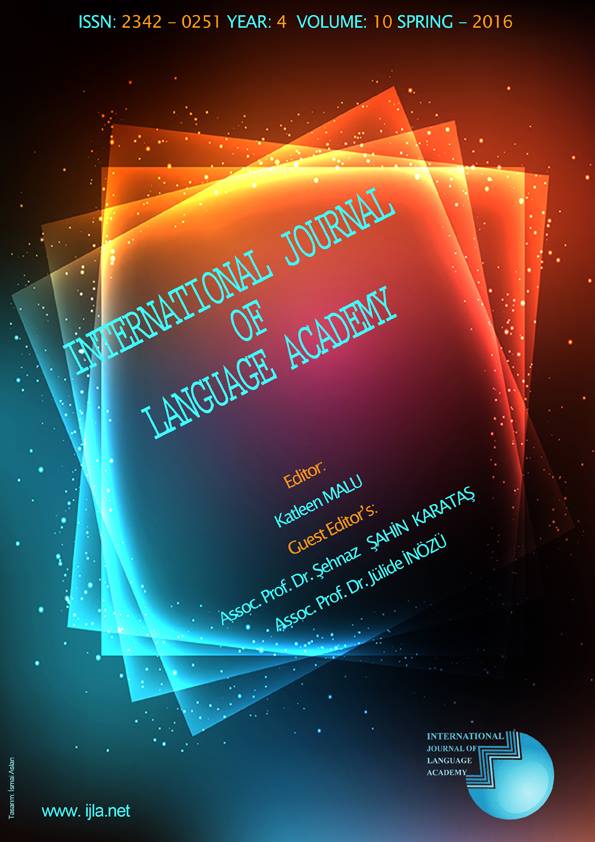Author :
Abstract
Bu çalışma ERASMUS yurtdışı öğrenci değişim programı sırasında Türk öğrencilerin İngilizce öğreniminde kendine olan inançlarıyla ilgili olarak yürütülmüştür. Verileri toplamak için bir vakıf üniversitesinde toplamda 21 öğrenciye anket dağıtılıp, içlerinden 5 öğrenciye ise sözlü mülakat uygulanmıştır.Sonuçlar şunu göstermektedir ki: ERASMUS yurtdışı öğrenci değişim programının değişim öğrencilerinin İngilizce öğrenimi üzerine pozitif bir etkisi olduğu görülmüştür. ERASMUS programı değişim öğrencilerine İngilizce öğrenme becerilerini geliştirmelerinde yardımcı olmuştur.
Keywords
Abstract
This paper concerns Turkish ERASMUS exchange students’ beliefs about English language learning experienced during Erasmus Student Exchange Programs abroad. In order to collect data, a questionnaire survey was presented to 21 ERASMUS Exchange students and an oral interview was applied to 5 Turkish exchange students at a foundation university. The results indicated that the ERASMUS exchange program has a great and positive impact on students’ English learning. ERASMUS program helped them to improve their English language skills.
Keywords
- Alexander, P. A.,& Dochy, F. J. R. C. (1995). Conceptions of knowledge and beliefs: a comparison across varying cultural and educational communities. American Educational Research Journal, 32, 413-442.
- Bandura, A. (1997). Self-efficacy: The exercice of control. New York: W.H. Freeman and Company.
- Behrnd, V. & Porzelt, S. (2012). Intercultural competence and training outcomes of students with experiences abroad. International Journal of Intercultural relations, 36(2), 213-223.
- Bickeland, P. J.,& Lehmann, E. L. (1975). Descriptive Statistics for Nonparametric Models. The Annals of Statistics 3(5), 1038-1044.
- Borg, M. (2001). Teachers’ Beliefs. ELTJ, 55(2): p.186-188.
- Coronado-Aliegro, J. (2006). The effect of self-assessment on the self-efficacy of students studying Spanish as a foreign language. University of Pittsburgh, School of Education.
- Barcelos, A.M.F. (2000). Understanding teachers' and students' language learning beliefs in experience: A Deweyan approach. Unpublished doctoral dissertation. The University of Alabama,Tuscaloosa.
- Dole, J.A.,& Sinatra, G.A. (1994). Social psychology research on beliefs and attitudes: Implications for research on learning from text.
- Ellis, R. (2008). “Learner beliefs and language learning”, in Asian EFL Journal, 10, 4: 7- 25.
- Flavell, J.H. (1979). Metacognition and cognitive monitoring: a new area of cognitive development inquiry [Special Issue]. American Psychologist, 34(10), 906-911.
- Elola, I. & Oskoz, A. (2008). Blogging: Fostering intercultural competence development in foreign language and study abroad contexts (pp. 454-477). Foreign Language Annals.
- Horwitz, E.K. (1987). Surveying student beliefs about language learning.
- Holsti, O.R. (1969). Content analysis for the social sciences and humanities. Reading, MA: Addison-Wesley.
- Horwitz, E. K. (1985). Using student beliefs about language learning and teaching in the foreign language methods course. Foreign Language Annals, 18(4), 333-340. http://dx.doi.org/ 10.1111/j.1944-9720.1985.tb01811.x.
- Jenkins, J. (2009). English as lingua franca: Interpretations and attitudes. World Englishes, 28(2), 200-207.
- Kajala, P. (1995). Student beliefs (or metacognitive knowledge) about SLA reconsidered. International Journal of Applied Linguistics, 5(2), 191-204.
- Keles, Y. (2013). What intercultural communication barriers do exchange students of Erasmus program have during their stay in Turkey, Mugla. Procedia: Social and Behavioral Sciences,70, 1513-1524. Retrieved from http://dx.doi.org/10.1016/j.sbspro.2013.01.21
- Keles HN 2012. A research on perceived learned re-sourcefulness’ levels of Turkish academic staff. Pro-cedia-Social and Behavioral Sciences, 62: 258-262.
- Klassen, R. (2002). Writing in early adolescence: a review of the role of self-efficacy beliefs. Educational Psychology Review, 14(2), 173-203. doi:10.1023/A:1014626805572
- Leedy, P. & Ormrod, J. (2001). Practical research: Planning and design(7th ed.). Upper Saddle River, NJ: Merrill Prentice Hall. Thousand Oaks: SAGE Publications.
- Pajares, F., & Schunk, D. H. (2001). Self-beliefs and school success. Self-efficacy, self- concept, and school achievement. In R. Riding & S. Rayner (Eds.), Self-perception (239-266). London: Ablex Publising.
- Patton, M.Q. (2002). Qualitative research & evaluation methods.
- Richards, J. C. & Lockhart, C. (1994). Reflective teaching in language teacher education.
- Sakui, K.,& Gaies, S.J. (1999). Investigating Japanese learners’ beliefs about language learning. System, 27(4), 473–492.
- Seidlholfer, B. (2005). Key concepts in ELT: English as a lingua franca. ELT Journal, 59, 339-341.
- Yang, J., & Kim, T. (2011). Sociocultural analysis of second language learner beliefs: A qualitative case study of two study-abroad ESL learners. System, 39, 325-334.
- Teichler, U., & Janson, K. (2007). The professional value of temporary study in another European country: Employment and work of former ERASMUS students. Journal of Studies in International Education, 11(3-4), 486-495.
- Weber, E. (1976). Peasants into Frenchmen: The modernization of rural France. Stanford University Press, 1870-1914.
- Zimmerman, B.J. (1995). Self-efficacy and educational development. A.Bandura (Ed.), Self-efficacy in changing societies (46-68). Cambridge: Cambridge University Press.
